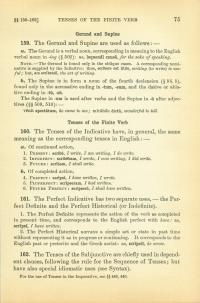160. The Tenses of the Indicative have, in general, the same meaning as the corresponding tenses in English.
a. Of continued action.
1. Present: Scrībō. I write. (I am writing, I do write.)
2. Imperfect: Scrībēbam. I wrote. (I was writing, I did write.)
3. Future: Scrībam. I shall write.
b. Of completed action.
1. Perfect: Scrīpsī. I have written. (I wrote.)
2. Pluperfect: Scrīpseram. I had written.
3. Future Perfect: Scrīpserō. I shall have written.
161. The Perfect Indicative has two separate uses—the Perfect Definite and the Perfect Historical (or Indefinite).
- The Perfect Definite represents the action of the verb as completed in present time, and corresponds to the English perfect with have.
Scrīpsī. I have written.
- The Perfect Historical narratesa simple act or state in past time without representing it as in progress or continuing. It corresponds to the English past or preterite and the Greek aorist.
Scrīpsit. He wrote
162. The Tenses of the Subjunctive are chiefly used in dependent clauses, following the rule for the Sequence of Tenses; but have also special idiomatic uses (see Syntax). For the use of Tenses in the Imperative, see §§ 448 - 449.

